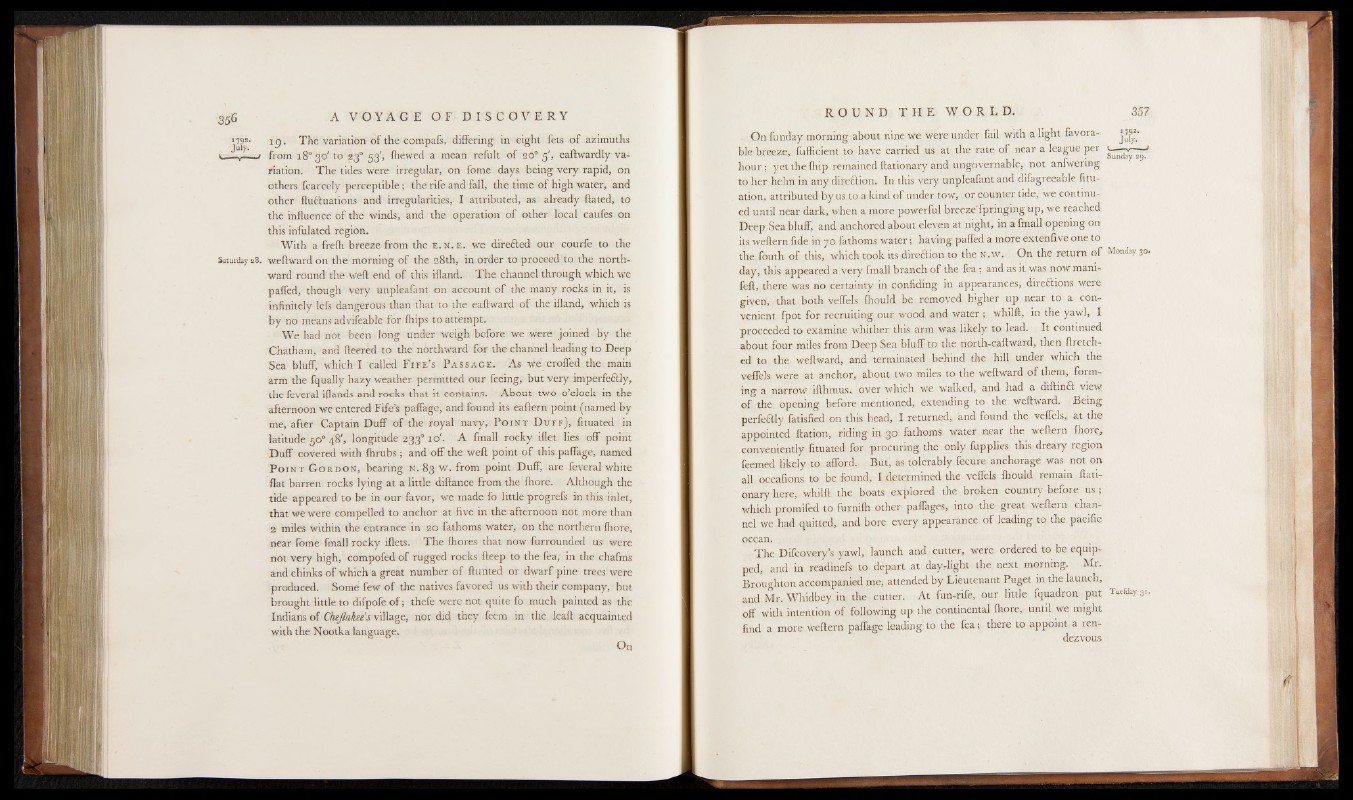
a792, ig . The variation of the compafs, differing in eight fets o f azimuths
« ■ from i 8°3o' to 230 53', (hewed a mean refult of 20° 5', eaftwardly variation.
The tides were irregular, on fome days being very rapid, on
others fcarcely perceptible; the rife and fall, the time of high water, and
other fluctuations and irregularities, I attributed, as already dated, to
the influence of the winds, and the operation o f other local caufes on
this infulated region.
With a frefli breeze from the e . n . e . we direfted our courfe to the
Saturday 28. weflward on the morning of the 28th, in order to proceed to the northward
round the wed end of this ifland. The channel through which we
pafled, though very unpleafant on account of the many rocks in it, is
infinitely lefs dangerous than that to the eadward of the ifland, which is
by no means advifeable for (hips to attempt.
We had not been long under weigh before we were joined by the
Chatham, and deered to the northward for the channel leading to Deep
Sea bluff, which I called F i f e ’ s P a s s a g e . A s we eroded the main
arm the fqually hazy weather permitted our feeing, but very imperfectly,
the feveral iflands and rocks that it contains. About two o’clock in the
afternoon we entered Fife’s paflage, and found its eadern point (named by
me, after Captain Duff o f the royal navy, P o i n t D u f f ) , fituated in
latitude 50° 48', longitude 233° 10'. A fmall rocky iflet lies off point
Duff covered with fhrubs ; and off the wed point of this paflage, named
P o i n t G o r d o n , bearing n . 83 w . from point Duff, are feveral white
flat barren rocks lying at a little didance from the fhore. Although the
tide appeared to be in our favor, we made fo little progrefs in this inlet,
that we were compelled to anchor at five in the afternoon not more than
2 miles within the entrance in 20 fathoms water, on the northern fhore,
near fome fmall rocky iflets. The fhores that now furrounded us were
not very high, compofed of rugged rocks deep to the fea, in the chafms
and chinks o f which a great number of dunted or dwarf pine trees were
produced. Some few of the natives favored us with their company, but
brought little to difpole o f ; thefe were not quite fo much painted as the
Indians of Chejlakee’s village, nor did they feem in the lead acquainted
with the Nootka language.
O n
R O U N D T H E W O R L D .
1792.
July-
Sunday 29.
On funday morning about nine we were under fail with a light favorable
breeze, fufficient to have carried us at the rate of near a league per
hour; yet the {hip remained ftationary and ungovernable, not anfwering
to her helm in any dire&ion. In this very unpleafant and difagreeable fitu-
ation, attributed by us to a kind o f under tow, or counter tide, we continued
until near dark, when a more powerful breeze'fpringing up, we reached
Deep Sea bluff, and anchored about eleven at night, in a fmall opening on
its weflern fide in 70 fathoms water; having palled a more extenfive one to
the fouth of this, which took its direftion to the N.w. On the return of Monday 30.
day, this appeared a very fmall branch of the fea; and as it was now mani-
feft, there was no certainty in confiding in appearances, directions were
given, that both veffels fhould be removed higher up near to a convenient
fpot for recruiting our wood, and water ; whilft, in the yawl, I
proceeded to examine whither this arm was likely to lead. It continued
about four miles from Deep Sea bluff to the north-eaftward, then ftretch-
ed to the weflward, and terminated behind the hill under which the
veffels were at anchor, about two miles to the weflward o f them, forming
a narrow iflhmus, over which we walked, and had a diftinft view
of the opening before mentioned, extending to the weflward. Being
perfe&ly fatisfied on this head, I returned, and found the veffels, at the
appointed flation, riding in 30 fathoms water near the weflern fhore,
conveniently fituated for procuring the only fupplies this dreary region
feemed likely to afford. But, as tolerably fecure anchorage was not on
all occafions to be found, I determined the veffels fhould remain flationary
here, whilft the boats explored the broken country before us;
which promifed to furnifh other paffages, into the great weflern channel
we had quitted, and bore every appearance of leading to the pacific
ocean.
The Difcovery’s yawl, launch and cutter, were ordered to be equip-
ped, and in readinefs to depart at dayjight the next morning. Mr.
Broughton accompanied me, attended by Lieutenant Puget in the launch,
and Mr. Whidbey in the cutter. At fun-rife, our little fquadron put Tucrdv 3,.
off with intention of following up the continental fhore, until we might
find a more weflern pafTage leading to the fea; there to appoint.a rendezvous